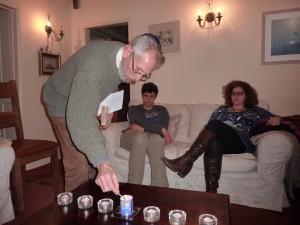We left Jacob, and his now large family, at the end of Vayetze, having made just made his peace with his father-in-law Laban and now ready to return to his father in Canaan. The beginning of the next parsha, Vayishlach, finds him fearful of meeting his brother Esau. After all, Jacob bought his birthright for a bowl of lentil soup and later cheated him out of his blessing. Who would not be fearful in such a case? Jacob is a wise strategist, however, and he plans his meeting with Esau in such a way as to reduce the chance of violence and to minimize its effect, should it occur. He divides his camp into two and sends a succession of tributes or peace offerings ahead.
The night before the meeting, Jacob wrestles with an angel, and thus Israel is born. The child who grabbed his brother’s heel becomes the man who struggles with God, and so we, the children of Israel, have been doing ever since. As Jacob is transformed, so is his relation with his brother. It turns out that he had nothing to fear from Esau, who greets him with great kindness, embraces and kisses him and weeps. This is a wonderful moment. The one who carries forward within himself the Covenant is reconciled with the brother he so sorely deceived years before and who now shows great generosity. Surely, Esau has earned God’s blessing too.
Jacob’s return is followed by the terrible episode of Dinah, Jacob’s only daughter (as far as we know). After the local Hivite chief Chamor, his son Shechem and all the men of the city have allowed themselves to be circumcised, is it right for Simeon and Levi to slay them because of the rape of their sister? Later Isaac dies and is buried by his sons Esau and Jacob, just as Abraham was buried by Isaac and Ishmael years before. The parsha ends with a genealogy of Esau and Edom, interesting if only because it is there.
This week, it is Vayeshev that we will be reading from, another momentous parsha, in which Joseph will make his appearance and in which yet another example of sibling rivalry will begin to play out. Let’s face it, Joseph could be seen as somewhat of a pain in the elbow by any band of brothers, though not enough to merit being butchered or sold into slavery. We will see him in Egypt, trusted by his master and betrayed by his mistress and flung into prison. Vayetze contains more, though, than Joseph’s misfortunes. It also tells the fascinating story of Judah and Tamar and of how a man can learn the meaning of righteousness and justice from the seemingly immoral behaviour of a daughter-in-law.
Enough already. For more come to the service this Saturday at 10.30. Liz Berg will be leading us and we will surely learn much more.
